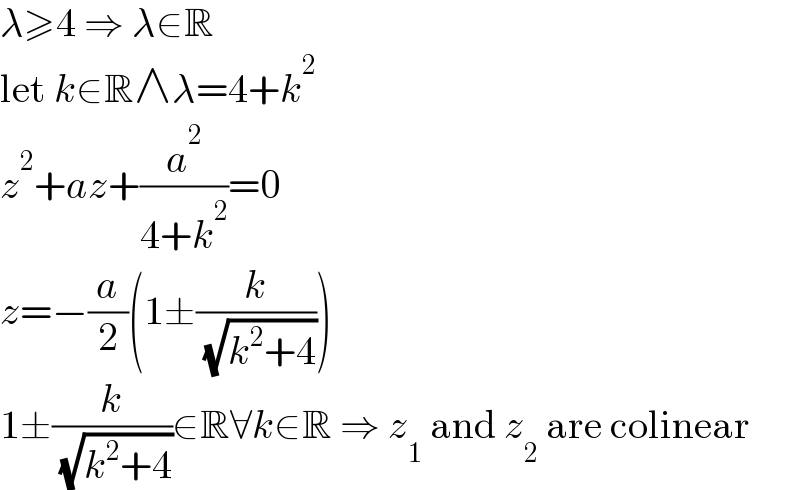Question Number 139641 by EnterUsername last updated on 30/Apr/21

$$\mathrm{Let}\:{a},\:{b}\:\mathrm{be}\:\mathrm{non}-\mathrm{zero}\:\mathrm{complex}\:\mathrm{numbers}\:\mathrm{and}\:{z}_{\mathrm{1}} ,\:{z}_{\mathrm{2}} \:\mathrm{be} \\ $$$$\mathrm{the}\:\mathrm{roots}\:\mathrm{of}\:\mathrm{the}\:\mathrm{equation}\:{z}^{\mathrm{2}} +{az}+{b}=\mathrm{0}.\:\mathrm{If}\:\mathrm{there}\:\mathrm{exists} \\ $$$$\lambda\geqslant\mathrm{4}\:\mathrm{such}\:\mathrm{that}\:{a}^{\mathrm{2}} =\lambda{b},\:\mathrm{then}\:\mathrm{the}\:\mathrm{points}\:{z}_{\mathrm{1}} ,\:{z}_{\mathrm{2}} \:\mathrm{and}\:\mathrm{the} \\ $$$$\mathrm{origin} \\ $$$$\left(\mathrm{A}\right)\:\mathrm{form}\:\mathrm{an}\:\mathrm{equilateral}\:\mathrm{triangle} \\ $$$$\left(\mathrm{B}\right)\:\mathrm{form}\:\mathrm{a}\:\mathrm{right}-\mathrm{angled}\:\mathrm{triangle},\:\mathrm{right}\:\mathrm{angled}\:\mathrm{at}\:\mathrm{the} \\ $$$$\:\:\:\:\:\:\:\:\:\:\mathrm{origin} \\ $$$$\left(\mathrm{C}\right)\:\mathrm{are}\:\mathrm{collinear} \\ $$$$\left(\mathrm{D}\right)\:\mathrm{form}\:\mathrm{an}\:\mathrm{obtuse}-\mathrm{angled}\:\mathrm{triangle} \\ $$
Answered by MJS_new last updated on 30/Apr/21

$$\lambda\geqslant\mathrm{4}\:\Rightarrow\:\lambda\in\mathbb{R} \\ $$$$\mathrm{let}\:{k}\in\mathbb{R}\wedge\lambda=\mathrm{4}+{k}^{\mathrm{2}} \\ $$$${z}^{\mathrm{2}} +{az}+\frac{{a}^{\mathrm{2}} }{\mathrm{4}+{k}^{\mathrm{2}} }=\mathrm{0} \\ $$$${z}=−\frac{{a}}{\mathrm{2}}\left(\mathrm{1}\pm\frac{{k}}{\:\sqrt{{k}^{\mathrm{2}} +\mathrm{4}}}\right) \\ $$$$\mathrm{1}\pm\frac{{k}}{\:\sqrt{{k}^{\mathrm{2}} +\mathrm{4}}}\in\mathbb{R}\forall{k}\in\mathbb{R}\:\Rightarrow\:{z}_{\mathrm{1}} \:\mathrm{and}\:{z}_{\mathrm{2}} \:\mathrm{are}\:\mathrm{colinear} \\ $$
Commented by EnterUsername last updated on 30/Apr/21

$$\mathrm{Thank}\:\mathrm{you}\:\mathrm{Sir}.\:\mathrm{Can}\:\mathrm{it}\:\mathrm{also}\:\mathrm{be}\:\mathrm{done}\:\mathrm{as} \\ $$$$\:\:\:\:\:\:\:\:\:\frac{{z}_{\mathrm{1}} −{z}_{\mathrm{0}} }{{z}_{\mathrm{2}} −{z}_{\mathrm{0}} }=\mathrm{cos}\alpha+\mathrm{isin}\alpha.\: \\ $$$$\mathrm{Then}\:\mathrm{proving}\:\mathrm{that}\:\alpha=\mathrm{k}\pi,\:\mathrm{k}\in\mathbb{Z} \\ $$
